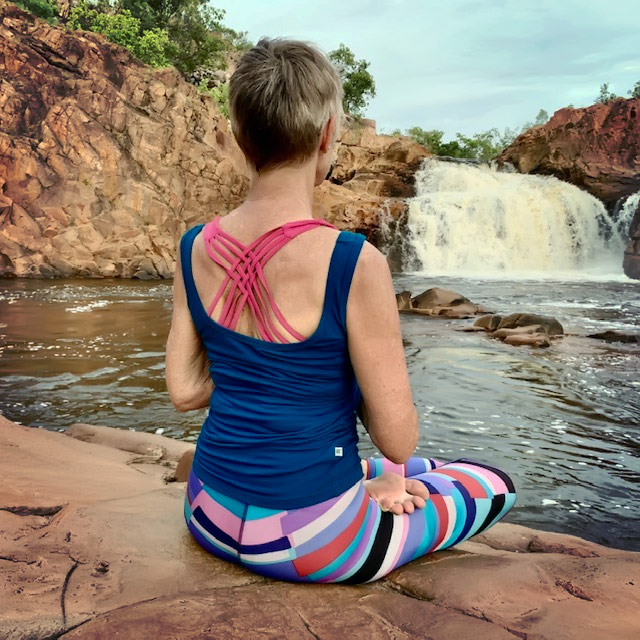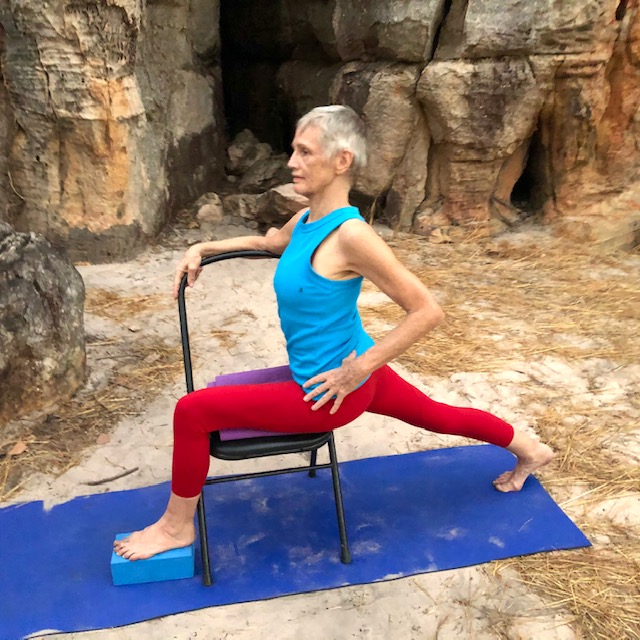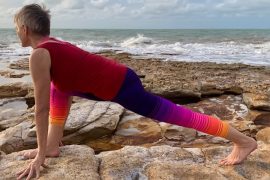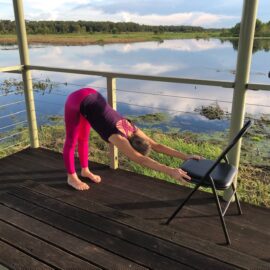My hair fell out from stress.
When I was at High School, two large chunks of my hair thinned, and then fell out, due stress. Yoga for alopecia areata (or yoga for hair loss) would have helped me. But yoga for anger management, and yoga poses for anger and frustration could have helped head off the 2022 Oscar horror about hair loss.
I remembered this when I saw the upsets at the 2022 Oscar awards. I’ll say more below about how yoga for anger management would have maybe helped prevent that situation. But first I’ll talk about how yoga for alopecia areata may would have helped me with own hair loss drama.
In the last year, well before the Oscars highlighted the potential for yoga for alopecia areata, I’ve also seen reports of women losing hair due to menopause or COVID19 stress, or both.
In my case, the stress was final year exams.
Forgive my lack of modesty, but, with my Irish background, I had beautiful long, auburn hair. The fact that it was one of my strong features, just made the impact of alopecia areata worse.
It was one more thing that I couldn’t tell Mum!
I was so embarrassed about the hair loss that I told nobody, not even my mother.
It freaked me out. At the time, I had no idea what caused it, how much it would expand, or how long it would last.
For an awfully long time, under my long hair, I had these bald patches on each side of my head.
Even worse, when the hair finally grew back, it was white. It never darkened.
Many decades later, the white patches are still visible on each side of the back of my head. In the picture with this post, you can see the remains of these white patches.
Thankfully or otherwise, I now have enough grey hair in other places so that the original white spots are camouflaged!
When it happened, I had long, auburn hair that I could brush over the bald patches.
But once I was living away from home, I used hair colour to hide the long white streaks.
Whenever I went to a hairdresser, they knew immediately what the patches were. I guess they see it regularly. Even now, they still always notice the original hair loss.
Years later, it was a hairdresser who told me it’s called alopecia areata… or alopecia for short.
Across the world, Alopecia also affects around 147 million people.

As a teenager, patches of my hair fell out, due to stress. The white spots at the back of my head still show where it happened. Yoga for alopecia areata (or yoga for hair loss) would have helped prevent it. But yoga for anger management, and yoga poses for anger and frustration could have helped head off the recent 2022 Oscar horror brought on by alopecia.
Stress causes hair loss
Although it’s not yet fully understood, medical authorities say this hair loss is triggered by:
- trauma
- hormonal change
- emotional or physical stressors.
As I prepared for final exams at school, that’s exactly all of the things that were going on for me in some combination.
At Flametree Yoga Studio, I now teach Women Only yoga. It’s about how to use yoga for female wellness, especially around the particular challenges that women face, like stress, exhaustion, menopause, fertility, menstruation, and post-menopause.
So I take particular interest in any studies I see about menopause.
As a result, I saw a recent new study about menopausal hair loss. It was also the impact of anxiety about the health challenges of the last couple of years.
All this led me to make the connection between stress, menopause, the last two years, with my own experience of hair loss.
With my new found insight, I turned to Healthline. It was able to tell me this.
“Research suggests that hair loss during menopause is the result of a hormonal imbalance. Specifically, it’s related to a lowered production of estrogen and progesterone. These hormones help hair grow faster and stay on the head for longer periods of time.
When the levels of estrogen and progesterone drop, hair grows more slowly and becomes much thinner.
A decrease in these hormones also triggers an increase in the production of androgens, or a group of male hormones. Androgens shrink hair follicles, resulting in hair loss on the head.
In some cases, however, these hormones can cause more hair to grow on the face. This is why some menopausal women develop facial “peach fuzz” and small sprouts of hair on the chin.
For women going through menopause, the cause of hair loss is almost always related to hormonal changes.
However, there are many other factors that can contribute to hair loss during menopause. These include extremely high levels of stress…
Healthline’s top tip on dealing with hair loss, or the risk of it, is to reduce stress.
In another post on my own menopause, I’ve told how I totally avoided any impact of menopause, including thinner hair or loss of hair.
When I read the above extract from Healthline, it reminded me that the yoga I do (and did during menopause) both reduced stress, and increased estrogen production.
Menopause and COVID19 stress causing hair loss
The new study I found of menopausal hair loss. also points to stress. It looked at the impact of both menopause and pandemic stress.
To my surprise, Dr. Sophia Kogan, who did the research, says women are several times more susceptible to hair loss than men.
Women have different hormonal pathways and factors that contribute to what they need for hair growth. Women also have phases in their lives, like menopause or pregnancy, that make them more susceptible to hair loss.
She again says that stress is a major factor that contributes to hair thinning and loss.
She explains that stress effects our hair throughout our entire lifetime. But during this past pandemic year, it’s been worse than ever. Dr Kogan says:
“During stress, hair follicles are synchronistically shifted, a huge number of them, into that resting phase,…. the body says, ‘I want to pull the resources internally. I don’t really need or care about hair. I want to preserve my life.’ And so it goes to the vital organs…. and all of a sudden, we have a massive amount of hair shedding about three to six months later.”
Dr Kogan also seems to have a clear idea of the how mindfulness, such as you get via yoga, is good at reducing stress. She talks about how it’s generally important to take time in your day for something that brings you into that flow state.
(“Flow” is where you are doing something that becomes sufficiently engrossing to totally take you mind off anything other than what you are doing in the moment).
Dr. Kogan says:
“Each person is going to be really different, but they’ve got to feel a feeling of calmness because that’s when you calm the nervous system.”
Yoga to reduce stress
All this new research made me feel even better about the numerous types of de-stressing classes we teach at Flametree Yoga.
It also reminded me that I do notice quite a number of menopausal women who have some degree of thinner hair. Even in my mother’s case, I think it was carefully disguised by the type of hair styling that was fashionable at the time.
As Westerners, we also often turn quickly to hair loss treatment, rather than at least also thinking about how to systematically and ongoingly reduce the stress or other issues that are the underlying cause of hair loss.
Like so many things, we charge on until it happens to us, just like I did.
Regular yoga classes, or especially restorative yoga classes, are one of the best and most systematic ways to reduce stress, including the risk of hair loss. Obviously, you then also get many other benefits of yoga.
The longer I’ve done yoga, the more I’ve learnt how to feel the power of easy relaxing positions that just drain the stress straight from my body and mind.
A male yoga student also reminded me how he found that using yoga postures to relax was a learnt skill that took ongoing and regular restorative yoga. The more he did relaxing poses, the more he found he could let go and feel the stress just ooze out of him. In particular, it helped him sleep better.
At yoga, we also do inverted (upside down) poses, and standing poses. In all of these poses, you absolutely have to focus in order to avoid falling over! This also produces exactly the type of mindful flow experience that Dr Kogan is talking about.
Calming yoga classes for people who are initially stiff
At Flametree, we do a more than average number of slower classes that maximise calming.
These classes are especially able to be accessed by people who are stiff.
You don’t have to be flexible to start or restart yoga. The whole point of slow or introductory yoga is to provide a yoga class on the assumption that people will initially be stiff, unfit, and not strong.
These slower and easier types of classes, both live online, and in-studio (in the Darwin, NT region,) include:
- Gentle Yoga
- Restorative Yoga
- Women Only Yoga.
- Back Neck and Shoulder Care Yoga
In the case of Women only yoga, we teach quite a number of restorative yoga poses, with particular focus both on calming and on managing the hormones that need attention due to the phases of a woman’s life.
s

Gentle yoga poses, like this one, reduce stress. Cutting stress helps numerous conditions. Its therefor a key part of yoga for alopecia areata (or yoga for hair loss). In this regard, I mean yoga that reduces the risk of hair loss. Stress reduction is also a key part of yoga for anger management, and yoga poses for anger and frustration. The simplicity of the poses, like this one, and the use of props, shows how anyone can do it.
Yoga for anger management
As many in the world now know, the 2022 Oscars saw a horrifying and very unnecessary embarrassment to Jada, the wife of Will Smith.
It’s now even more widely known that she has alopecia. From my own experience, I know just how horrifying the condition can be.
Ironically, the types of yoga that I’ve outline above, as well as a lot of other yoga, could have reduced the anger that led to the Oscars fracas.
Yoga for anger management, and yoga poses for anger and frustration, are both the natural outcome of doing sufficient yoga. The reality is that sufficient regular yoga, in colloquial terms, chills people out. The anger either dissipates, or becomes controllable.
In other words, yoga poses and breathing practices automatically produce a more mindful and calm state. Impulsive reactions and upsets then have far less chance of breaking through your yogic state.
Yoga allows you to live with more equanimity. That means you’re happier, calmer, and more satisfied with life.
I (Chris Lalor) rate equanimity even more highly than the better health, and less pain, that will also follow.
As we all know, the world would be a lot better place if more people did yoga to manage anger and frustration. The angry people would also be much happier, and would likely live longer.
For instance, so-called Type A personalities (also known, in Ayurveda, as Pitta types), are more prone to stress, anger, and heart attacks.
If you want proof, then please check out the extensive review of clinical trials in the relevant chapters of Yoga As Medicine, by Dr Tim McCall.
To prove what I say, an even better option is to start yoga, or do more yoga. Please use Flametree’s many good value deals. You’ll believe it when you feel it… and feel it you will.
How to start or re-start yoga
Yoga for alopecia areata (or yoga for hair loss) flows naturally as an outcome of doing any good yoga. The same is true if you want yoga for anger management, or yoga poses for anger and frustration. All good yoga, such outlined further below, will deliver you these outcomes, and all the many yoga benefits.
The type of Special Focus yoga classes that I mention in this post, as well as all other yoga classes, can be done as part of Flametree’s normal weekly timetable of classes.
These classes are also included within various packages, such as the beginner and non-beginner deals below.
At any time, Beginners can start via our week-to-week deal, including two weeks free. The new four-week beginner course can also be joined at any beginner class in the two weeks after the course starts. As soon as you get a pass, you can also start two weeks of unlimited free classes at the beginner level.
NON-BEGINNERS, who are new to Flametree, or lapsed students, get 30 days of unlimited online non-beginner classes for just $14.95. That’s much less than $2 a class for daily non-beginner yoga. It includes yoga for anger and frustration, and much more.
[jetpack-related-posts]



